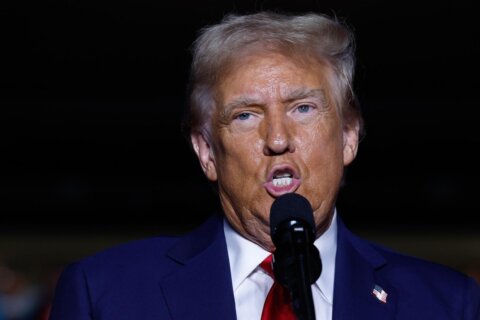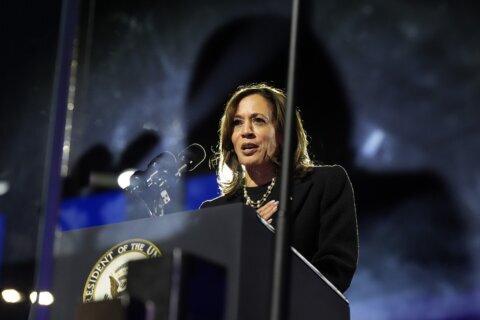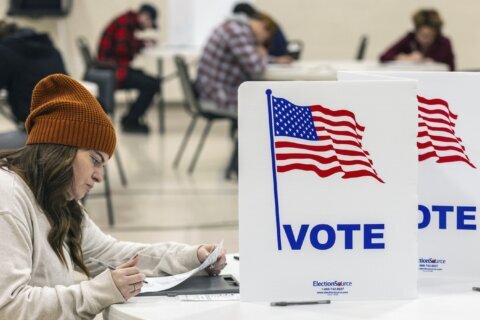A series of high-stakes presidential debates began Tuesday, Sept. 29, between President Donald Trump and former Vice President Joe Biden.
The first debate, at Case Western Reserve University, in Cleveland, marked the first time the two candidates directly faced each other in a presidential race that’s been altered by the pandemic.
Since then, Trump has tested positive for the coronavirus and the next planned debate, scheduled for Oct. 15, was canceled after Trump said he would not participate in a virtual debate format.
Still, the second — and now final — debate is scheduled to take place Thursday, Oct. 22, starting at 9 p.m.
Here’s what you need to know about all the debates:
- Q:
When is the next presidential debate? What are the topics? Will mics be muted?
- A:
The final presidential debate will be held Oct. 22 at Belmont University, in Nashville. The debate will be moderated by Kristen Welker, NBC News’ White House correspondent.
The debate will be from 9 p.m. to 10:30 p.m. Eastern Time with no commercial breaks.
You can watch and listen to all of the debates on a live stream at WTOP.com.
The topics for the debate, as selected by the moderator, are: fighting COVID-19, American families, race in America, climate change, national security and leadership.
After the raucous first debate, the commission announced new rules this week to limit interruptions. Trump and Biden will each have two minutes on uninterrupted time at the beginning of each 15-minute segment.
To enforce the rule, the candidate who does not have the floor will have his mic muted, the commission said.
- Q:
What happened to the second debate?
- A:
The second presidential debate between Trump and Biden was called off earlier this month.
After Trump was diagnosed with COVID-19, the Commission on Presidential Debates announced the next matchup, set for Miami, would take place virtually because Trump had contracted the virus.
Trump then announced he would not take part in a virtual debate, and Biden scheduled a town hall with ABC News for that same night.
Trump later ended up holding a competing town hall in Miami, broadcast by NBC News, on the same night.
- Q:
What about the vice presidential debate?
- A:
The one debate between Vice President Mike Pence and Biden’s running mate, Sen. Kamala Harris, was held Oct. 7 at the University of Utah in Salt Lake City.
It was moderated by Susan Page, the Washington bureau chief for USA Today. (Page often provides political analysis on WTOP.)
- Q:
How will this debate be unlike any other?
- A:
The two men are the oldest presidential candidates to face off in a televised presidential debate. Trump is 74 and Biden is 77.
President Ronald Reagan had a memorable moment during his 1984 debate with Democratic presidential nominee Walter Mondale, in which he turned things around on his age. At the time, Reagan was the oldest presidential candidate in the country’s history, at 73.
In response to a question, Reagan had a glib response, noting that he would not make age an issue in the campaign.
“I am not going to exploit, for political purposes, my opponent’s youth and inexperience,” he said to laughter, which even brought a broad smile from Mondale.
After a somewhat shaky first debate, that exchange in the second debate helped Reagan’s poll numbers rise and he was eventually reelected.
- Q:
What are some of the most memorable debate moments?
- A:
In his 2012 reelection campaign, President Barack Obama had what many political observers agreed was a lackluster first debate against Republican nominee Mitt Romney. After the first debate, Romney moved closer in the polls.
Obama was more focused and feisty in his second debate, and polling of voters indicated most Americans felt he won that faceoff. He went on to win a second term.
A bad moment during a debate can also hurt a candidate — for example, in President Gerald Ford’s 1976 debate against Jimmy Carter, who at the time was the governor of Georgia. Heading into the debate, a lot of questions had been raised about Carter’s ability to deal with major foreign policy issues. But it was a foreign policy matter that Ford stumbled on.
Asked about Soviet influence over Eastern Europe, he said, “There is no Soviet domination of Eastern Europe and there never will be under a Ford administration.”
The response drew major headlines after the debate, with many experts questioning the president’s assertion, given Soviet occupation of Eastern European countries.
It should be noted that Ford also had to deal with many other factors, including the fact that well before the debates, he trailed Carter in the polls by more than 30 points. Ford had also pardoned President Richard Nixon after Watergate, and the single debate was far from the only factor in his election loss.
- Q:
Are these debates likely to change any minds?
- A:
The impact of the debates looks to be limited.
Many voters make up their minds long before Election Day. Research has found that close to 7 in 10 voters have their minds made up two months before an election.
In this election, polls suggest more than 90% of Americans have already decided who will get their vote in the presidential race.
Also, voting has already begun in several states, including Virginia, so many people will have already voted before the first debate.
The first debate between Trump and Hillary Clinton in 2016 was the most-watched presidential debate in TV history. Polling afterward found that most people felt Clinton won the debate, but it didn’t lead to a win in the Electoral College.
An extensive study of debates in the U.S. and other countries concludes that debates do not have an impact on any group of voters.
Still, given the extraordinary circumstances in which these debates will be held — during a once-in-a-century pandemic that’s led to the greatest economic crisis since the Great Depression — there will no doubt be intense interest.








